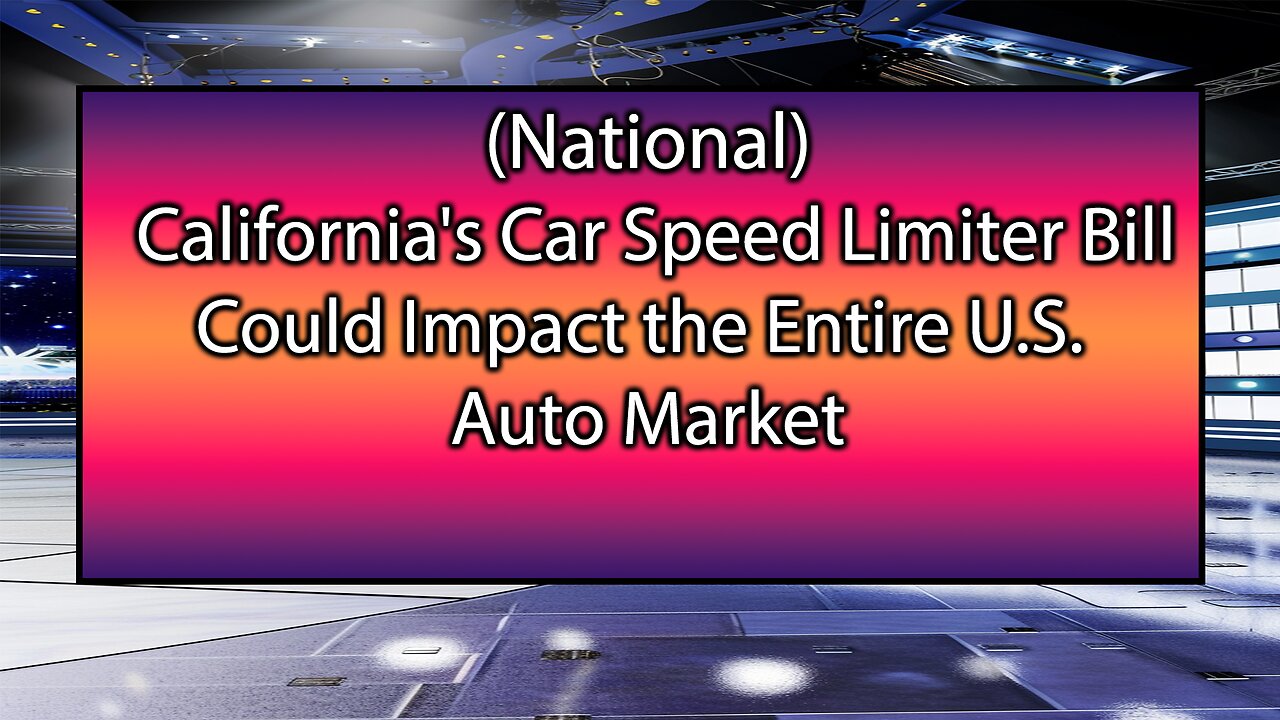Premium Only Content

California's Car Speed Limiter Bill Could Impact the Entire U.S. Auto Market
The California Senate passed SB 961 on Tuesday, May 21, 2024, a bill that would mandate all new cars sold or manufactured in the state to be equipped with "passive speed limiters" by 2032. The bill, introduced by Senator Scott Wiener (D-San Francisco), aims to reduce traffic fatalities and improve road safety.
Passive speed limiters, also known as intelligent speed assistance or passive speed governors, use GPS technology to compare a vehicle's speed with a database of posted speed limits. When the driver exceeds the speed limit by more than 10 mph (16 kph), the system emits visual and audible alerts to warn the driver.
If SB 961 becomes law, California would be the first state in the U.S. to implement such a requirement, following in the footsteps of the European Union, which is set to mandate similar technology in all new cars starting in July 2024.
According to the California Office of Traffic Safety's 2023 Traffic Safety Report, fatal crashes involving alcohol and drug-impaired driving, motorcyclist fatalities, and teenage driver fatalities all increased from 2020 to 2021. Senator Wiener stated that these deaths are preventable and are occurring due to policy choices that tolerate dangerous roads.
The National Highway and Traffic Safety Administration estimates that 10% of all car crashes reported to police in 2021 were speeding-related, with California having the second-highest percentage (35%) of speeding-related traffic fatalities in the country.
While proponents of the bill argue that the technology has the potential to reduce speeding and save lives, opponents, such as Republican state Sen. Brian Dahle, contend that the measure creates a "nanny state" and may hinder emergency response times when exceeding the speed limit is necessary.
The bill's speed governor requirement does not apply to emergency vehicles.
Due to California's significant influence on the U.S. auto market, the passage of SB 961 could have far-reaching implications for car manufacturing nationwide, as automakers would likely comply with the state's law for all vehicles to streamline production and avoid creating separate models for different markets.
SB 961 passed the California Senate by a vote of 22-13 and now moves to the State Assembly, where it must pass by Aug. 31, 2024, to become law.
Some critics argue that the bill is a step towards a future where tools become masters, as the technology would constantly monitor and potentially reprimand drivers for their behavior on the road. They worry that this could lead to a loss of freedom and independence behind the wheel.
Supporters of the bill, however, maintain that the passive speed limiters are intended to serve as a safety reminder and that drivers would still have control over their vehicles, with the ability to override the system if necessary.
The National Transportation Safety Bureau (NTSB) has urged 17 automakers to install intelligent speed assistance technology in all new vehicles, which would, at a minimum, warn drivers when they are speeding. The NTSB believes that this technology, along with countermeasures such as interlock programs for repeat speeding offenders, is necessary to address the issue of speeding-related accidents.
In January 2022, the NTSB recommended that federal regulators require all new cars to alert drivers when speeding, following a crash involving a man with a history of speeding violations who was traveling more than 100 miles per hour when he ran a red light and collided with a minivan, killing himself and eight other people.
The bill package also includes provisions for side underride guards on trucks to reduce the risk of cars and bikes being pulled underneath during a crash, as well as physical improvements like new crosswalks and curb extensions on state-owned surface streets to better accommodate pedestrians, cyclists, people with disabilities, and transit users.
While some people have expressed concerns about the potential for the technology to be used for monitoring driving habits and taxing motorists based on miles driven and time on the road, supporters argue that the primary focus should be on improving road safety and reducing preventable deaths.
-
 16:43
16:43
GritsGG
16 hours agoThey Buffed This AR & It Slaps! Warzone Loadout!
12.3K1 -
 2:05:30
2:05:30
Side Scrollers Podcast
20 hours agoEveryone Hates MrBeast + FBI Spends $140k on Pokemon + All Todays News | Side Scrollers Live
106K11 -
 11:06
11:06
The Pascal Show
14 hours ago $1.32 earned'THEY'RE GETTING DEATH THREATS!' Jake Haro's Lawyer Breaks Silence On Emmanuel Haro's Disappearance!
14K2 -
 LIVE
LIVE
Lofi Girl
2 years agoSynthwave Radio 🌌 - beats to chill/game to
318 watching -
 2:19:32
2:19:32
Badlands Media
1 day agoDEFCON ZERO Ep. 005: False Flags, Cyber Fronts & Global Power Plays
153K66 -
 2:35:23
2:35:23
FreshandFit
9 hours agoWhy Black Men Don't Date Black Women Debate
43.5K40 -
 2:03:42
2:03:42
Inverted World Live
13 hours agoBigfoot Corpse Coming to the NY State Fair | Ep. 94
111K27 -
 6:16:23
6:16:23
SpartakusLIVE
14 hours ago$1,000 Pistol Challenge || #1 ENTERTAINER of The EONS Eradicates BOREDOM
87.4K2 -
 2:33:37
2:33:37
TimcastIRL
11 hours agoTrump Orders Review of Smithsonian For Being Woke & Out of Control | Timcast IRL
194K88 -
 3:09:10
3:09:10
Barry Cunningham
15 hours agoPRESIDENT TRUMP HAS TAKEN THE MONSTER AWAY FROM THE LEFT! HORROR STORIES WON'T WORK ANYMORE!
85.8K83